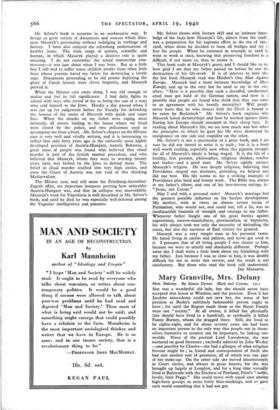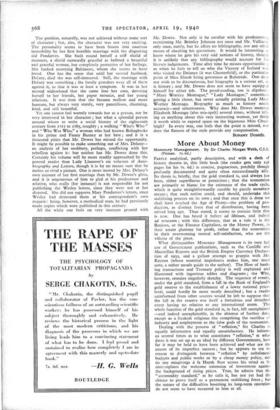Mary Granville, Mrs. Delany
Mrs. Delany. By Simon Dewes. (Rich and Cowan. 15s.) SHE was a wonderful old lady, but she should never have accepted that house at Windsor, and the pension. Even if her Jacobite antecedents could not save her, the sense of her position as Burke's sublimely fashionable person ought to have ; for until the Regent made them so the Royal Family were not " society." At all events, it killed her physically (she should have lived to a hundred), as spiritually it killed Fanny Burney, whom she dragged there. Still, she lived to be eighty-eight, and for about seventy years she had been an important person in the only way that people not in them- selves formative or creative can be important, by linking two worlds. Niece of the poetical Lord Lansdowne, she was nurtured on good literature ; excitedly admired by John Wesley —and possibly by Charles—she had a glimpse of what religiqus fervour might be ; as friend and correspondent of Swift she had met another sort of greatness, all of which was one part of her make-up. On the other side she moved intermittently in Court circles, and always in great houses, for she was brought up largely at Longleat, and for a long time virtually lived at Bulstrode with the Duchess of Portland, Prior's " noble, lovely, little Peggy." She could move with equal ease among high-born gossips or more lowly blue-stockings, and so gave each world something that it had not got.
The position, naturally, was not achieved without some sort of character ; but, alas, the character was not very exciting. The personality seems to have been frozen into cautious immobility by her first horrible marriage with the disgusting old Pendarves. She built round herself a stiff shield of manners, a shield outwardly graceful as befitted a beautiful and graceful woman, but completely protective of her feelings. She funked marrying Baltimore, whom she seems to have loved. One has the sense that until her second husband, Delany, died she was self-immured. ' Still, the marriage with Delany was something ; the family grandees were all of them against it, so that it was at least a symptom. It was in her second widowhood that she came into her own, devoting herself to her friends, her paper mosaics, and her young relations. It was then that she became mellow and more humane, but always very stately, very punctilious, charming, kind, and still beautiful.
Yet one cannot feel warmly towards her as a person, nor be very interested in her character ; but what a splendid person around whom to write a social history of the eighteenth century from 1715 to 1785, roughly ; a walking " Who's Who " and " Who Was Who," a woman who had known Bolingbroke in his prime and Fanny Burney at her best ; and it is a thousand pities that Mr. Dewes has missed the opportunity. It might be possible to make something out of Mrs. Delany— an analysis of her snobbery, perhaps, conflicting with her rebellion against it: but neither has Mr. Dewes done this. Certainly his volume will be more readily approached by the general reader than Lady Llanover's six volumes of Auto- biography and Letters, though it is by no means sure that he makes so vivid a picture. One is more moved by Mrs. Delany's own account of her first marriage than by Mr. Dewes's gloss, and it is ungenerous of him to gird at his predecessor and relative, who really (for instance) is not responsible for not publishing the Wesley letters, since they were not at her disposal. She did not suppress Mary Pendarves's letters, since Wesley had destroyed them at his correspondent's own request: being, however, a methodical man, he had previously made copies which were published in this century.
All the while one feels on very insecure ground with
Mr. Dewes. Not only is he cavalier with his predecessors, mentioning Mr. Brimley Johnson not once and Mr. Vulliarny only once, curtly, but he offers no bibliography, nor any other means of checking his quotations. It would be interesting to know where he gets his very odd notions of history, though it is unlikely that any bibliography would account for his literary judgements. Time after time he misses opportunitie, ; as when he fails to tell us who the Viceroy of Ireland was who visited the Delanys (it was Chesterfield), or the particular point of Miss Elstob being governess at Bulstrode. One does not wish to be discourteous, but biography is a serious art, as is history ; and Mr. Dewes does not seem to have equipped himself for either job. The proof-reading, too. is slipshod : "Mary Worsley Montague," "Lady Montague," sometimes getting a little closer, but never actually printing Lady Mary Wortley Montagu. Biography as much as history needs accuracy—and selectiveness. Why does Mr. Dewes mention Elizabeth Montagu (also mis-spelt) several times, without tell- ing us anything about this very interesting woman, yet think it worth while to expend space on the bigamous Miss Chud- leigh? In every way, one feels that the point is missed, nor does the flatness of the style provide any compensation.
BONAMY DOBRIIE.











































 Previous page
Previous page